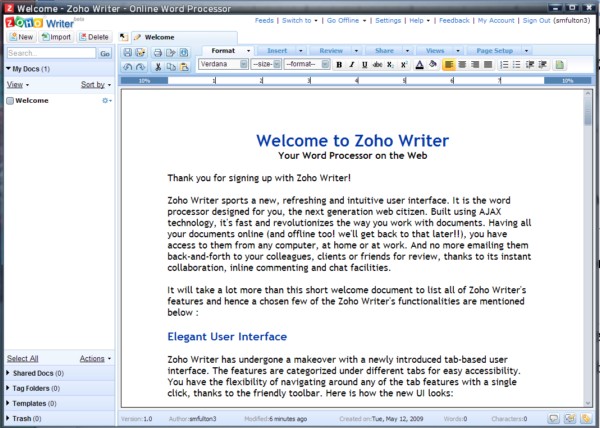
OpenOffice 3.1 goes to bat against Office 2007 SP2
It's almost trite to talk about OpenOffice's aesthetics, as if the best way to figure out whether the open source apps suite is competitive to Microsoft Office is to hold a beauty contest. Yes, interface matters, but it's not the only thing that matters, so let's get this out of the way:
Dear person or persons who worked on the anti-aliasing feature that makes the screen look so much nicer: Thank you. It was noticed. It is appreciated. This review required about one-third as much aspirin as usual for her review and I owe those aspirin all to you.

French Assembly passes 'three strikes' HADOPI law
The highly controversial French Création et Internet law, which gives ISPs there the power to block access to the Internet for anyone accused three times of illegal file-sharing, is on a collision course with the EU after winning approval in a well-attended 296-233 vote in the National Assembly. The bill previously passed the National Assembly on a rather smaller, dead-of-night 21-15 vote.
The bill is also known as HADOPI, the High Authority for Copyright Protection and Dissemination of Works on the Internet. That's the proposed organization to be charged with monitoring compliance if the bill passes into law.

Android gets augmented reality for stars, check out the barcode
Today, Google released Sky Map for Android, a free program which uses GPS, compass, and other sensory data to label the stars, constellations, planets and other heavenly bodies when a user aims his android device at the sky, sort of a handheld extension of Google Sky, which debuted almost two years ago.
Since Sky Map doesn't require a line of sight to ascertain the user's location, the phone can be aimed in any direction, and locate constellations wherever they happen to be in space relative to the user's position. This means night or day, indoors or out, the phone can be aimed in any direction and grab any celestial data and still have the app weigh in at only 60 KB.

Every UK home to get a smart meter
By 2020, every British household could be equipped with a smart meter -- a device that will allow for a higher level of granularity in tracking a home's energy consumption, and could lead to an overall reduction in carbon waste. Last October, the UK Government announced that intended to mandate smart meters for all households and small and medium-sized business sites.
Yesterday, the Department of Energy and Climate Change's (DECC) Ed Miliband announced the government has launched a public consultation (found here) on the implementation of smart meters which will be open until August 3.

Windows 7 gives Firefox 3, IE8 speed boosts, while Firefox 3.5 slows down
In preliminary Betanews tests Tuesday comparing the relative speeds of major Web browsers in Windows Vista- and Windows 7-based virtual machines, not only did the general performance of Microsoft Internet Explorer 8 improve by about 23%, but the latest production build of Firefox 3.0.10 appears to improve its performance by 17.5%. This despite running in a Windows 7-based virtual machine that we estimate to be 12.1% slower overall than a Vista-based VM hosted by the same environment.
These are the initial findings of Betanews' experiments in how the architecture of Windows 7 may or may not influence the performance of major Web browsers. We wanted to see whether Win7 made browsers faster or slower, and doing that meant hosting browsers in virtual environments whose relative speeds with respect to one another could be normalized.

Nokia's file sharing site gets de-prioritized
Nokia's Ovi Share has been put into stasis. Ovi Share was built from Redmond startup Twango which Nokia purchased in 2007. As a part of its online services restructuring that the company announced in late April, Ovi Share will continue to exist, but with a considerably dimmer future.
A Nokia representative was quoted by Reuters today as saying the service is just "planned to be maintained in its current state," with no further investments being put toward development as the company restructures its services department.

The Web without the browser: Mozilla's Prism enables true Web apps
Download Mozilla Prism for Windows 1.0 Beta 1 from Fileforum now.
Mozilla Labs has been devoted to building ideas into viable code that may or may not become products someday. For a year and a half, one of its tasks has been to build a framework for deploying Web-based applications straight to the desktop, while introducing though not necessarily mandating a new methodology or set of practices for sites to follow. In other words, if an application is already live in a browser like Firefox, let's take it out of the browser motif and move it to the desktop.

Islamic Linux distro changes its name to avoid trademark dispute
We all remember Windows Me. It's a moniker that has become synonymous with incomparable stability problems and generally ridiculous bugs. Did you know that until recently there was also an Ubuntu Me? The "Me" in its case stood for "Muslim Edition."
Currently, however, the Linux distribution catering to the Islamic faith has sloughed off both its association to "Me" as well as its outward association to Ubuntu, and has changed its name to Sabily, a term taken from a Qur'anic verse which translates to "my way."

Russinovich rescues the TechEd 2009 keynote with Windows 7 AppLocker demo
In the absence of many dramatically new product announcements (notices about the Office 2010 technical preview and Windows Mobile 6.5 were already expected), it was Senior Vice President Bill Veghte's job for the first time to rally the troops during this morning's TechEd 2009 keynote address in Los Angeles. But perhaps not everyone has Bill Gates' knack for holding an audience captive with sweeping gerunds and participles, or Ray Ozzie's outstanding ability to conjure a metaphor as though it were a hologram hovering in space, and describe it for countless minutes without relating it to the physical universe.
What may have kept attendees affixed to their seats for the time being was the promise of Mark Russinovich, Microsoft's Technical Fellow who always dives right into a real-world demonstration in the first few minutes, and is always affable enough to be forgiven for the inevitable technical glitch. Though Russinovich's stage time today was shorter than usual, one of his highlights was a demonstration of a feature Windows 7 RC downloaders had already received but may not have known they had: a way using group policy to block specified software from running on client systems even after it's been upgraded or revised.

Panda lofts its antivirus protection into the cloud
Download Panda Cloud Antivirus 0.9 from Fileforum now.
If the prospect of keeping important data out in the cloud still makes you slightly uneasy, you might get positively lightheaded at the thought of keeping your anti-malware protection up there. But Panda Cloud Antivirus, which entered beta recently, did a decent job of protecting a test system from the bad stuff -- without shoveling our data into the ether, and without slowing our system down.

Developer registration opens for Windows Mobile Marketplace
Coinciding with Tech Ed's WM6.5 sessions today, the Windows Mobile team has opened developer registration for the Windows Mobile Marketplace.
First discussed in March, this is the only the initial step for developers to take toward making their apps available for the Marketplace when it debuts. Developers will be charged $99 to sell up to five apps annually, and will receive 70% of revenue from each app submitted and approved for sale.

Office 2010 Technical Preview to arrive in July
In a presentation to TechEd attendees this morning, Microsoft Senior Vice President Bill Veghte announced that the first versions of the Office 2010 suite to extend beyond the company's doors will be offered to selected Technical Preview candidates. Following up on the news, the company lifted the lid on a Web site that appears as though it was supposed to have been launched tomorrow, with a custom movie trailer and countdown clock that borrows visual elements and other catch-phrases from...well, from a handful of real summer blockbuster movies.
"The future begins now," rings a vaguely familiar bell. The arrangement of the characters in the graphics should recall some Terminator images. And "Countdown to the Beginning of Awesome" may be a stretch, but it harkens back to one of the best lines in Bolt.

Oklahoma: Texting takes on twisters
Oklahoma is the heart of "Tornado Alley," with more than 25 category F3, F4, and F5 tornadoes (the three most intense types) per 3,700 square miles per year. The National Oceanic and Atmospheric Administration recorded 77 incidents last year alone.
Now, coinciding with the spring and summer tornado season, the Oklahoma state legislature and the National Weather Service are reminding residents of the area that they can receive free emergency notification e-mails and text messages to supplement the familiar blaring air raid sirens and high-octane TV tornado warnings that echo throughout the Sooner State.

What makes Google tick? A management consultant takes an adoring look
Most business books are very much of a particular moment, and when that moment passes -- management changes, stock prices plummet, or the buzz that made the business book-worthy slips away -- the book seems dated. This, then is the moment to grab Bernard Girard's The Google Way. which documents the workings of the search giant.
Girard, a management consultant, has been tracking Google since 2000, and his book analyzes the structure and philosophy of the company even as it's grappled with the current recession. (This means we're more current than the French, who got an earlier version of this text in 2006 as Une Révolution du Management: le Modèle Google.) Girard sees the Sergey-Brin-Schmidt triumvirate as no less innovative than a Henry Ford or a Taiichi Ohno (the man who made Toyota a global powerhouse) or Ikea's Ingvar Kamprad. Google's strength, he posits, doesn't merely come from superior algorithms but from rethinking how a company functions.

Britons confused about their broadband, says survey
Following up on a report by Ofcom that UK broadband subscribers only get half of their promised speeds, comparison shopping site Broadband Genie today says not only are connections slower, but subscribers don't know what they're paying for.
Using the Thinkbroadband speed test, Broadband Genie surveyed customers of the top 8 UK broadband suppliers, asking what broadband package they subscribe to and what the promised speeds are. Like Ofcom's report (PDF here) which said Britain's average downlink speed is 3.6 Mbps of a promised 7.2 Mbps, the data showed that the average actual downlink speed for UK customers is 45.8% of the advertised speed limit.



